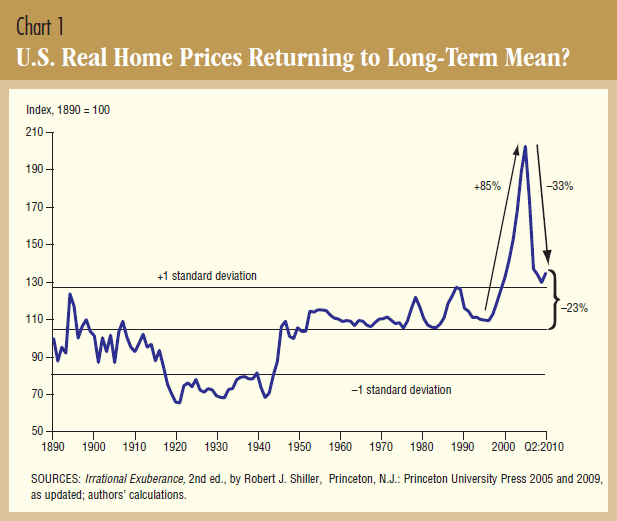As gauged by an aggregate of housing indexes dating to 1890, real home prices rose 85 percent to their highest level in August 2006. They have since declined 33 percent, falling short of most predictions for a cumulative correction of at least 40 percent.[1] In fact, home prices still must fall 23 percent if they are to revert to their long-term mean (Chart 1).
. . .
One factor inhibiting the new-home market is a growing supply of existing units. The 3.9 million homes listed in October represent a 10.5-month supply. One in five mortgage holders owes more than the home is worth, an impediment that could hinder refinancings in the next year, when a fresh wave of adjustable-rate mortgages is due to reset. The number of listed homes, in other words, is at risk of growing further. This so-called shadow inventory incorporates mortgages at high risk of default; adding these to the total implies at least a two-year supply.
. . .
The average number of days past due for loans in the foreclosure process equates to almost 16 months, up 64 percent from the peak of the housing boom. One in six delinquent homeowners who haven’t made a payment in two years is still not in foreclosure. Mounting bottlenecks suggest the shadow inventory will grow in the near term.
. . .
Without intervention, modest home price declines could be allowed to resume until inventories clear. An analysis found that home prices increased by about 5 percentage points as a result of the combined efforts to arrest price deterioration.[7] Absent incentive programs and as modifications reach a saturation point, these price increases will likely be reversed in the coming years. Prices, in fact, have begun to slide again in recent weeks. In short, pulling demand forward has not produced a sustainable stabilization in home prices, which cannot escape the pressure exerted by oversupply (Chart 3).
. . .
This unease highlights the housing market’s fragility and suggests there may be no pain-free path to the eventual righting of the market. No perfect solution to the housing crisis exists. The latest price declines will undoubtedly cause more economic dislocation. As the crisis enters its fifth year, uncertainty is as prevalent as ever and continues to hinder a more robust economic recovery. Given that time has not proven beneficial in rendering pricing clarity, allowing the market to clear may be the path of least distress.
“The Fallacy of a Pain-Free Path to a Healthy Housing Market,” by Danielle DiMartino Booth and David Luttrell, Economic Letter—Insights from the Federal Reserve Bank of Dallas, December, 2010 (emphasis added)
For further thoughts about the coming wave of increases in property taxes, see “Florida League of Cities Poll on Police and Fire Salaries Shows Public out of Touch Regarding Benefits,” by Mike Shedloc, December 23, 2010 (“Cities need to do a far better job at education [sic] the public just how exorbitant police and fire contracts are, and that it is tax dollars that support those untenable benefits, putting cities in financial jeopardy.”)
See also:
- “Pensions Push Taxes Higher,” by Jeanette Neumann, The Wall Street Journal, December, 24, 2010 (“Cities across the nation are raising property taxes, largely citing rising pension and health-care costs for their employees and retirees.”)
- “What are the chances of muni doomsday?” by Felix Salmon, Reuters, December 22, 2010 (“So my feeling is that Whitney is probably wrong, and that we won’t see a lot of municipal defaults next year. But at the same time, the tail risk here is significant. If it gets bad, it could get very bad.”)
For more than 40 years, TheCapitol.Net and its predecessor, Congressional Quarterly Executive Conferences, have been teaching professionals from government, military, business, and NGOs about the dynamics and operations of the legislative and executive branches and how to work with them.
Our custom on-site and online training, publications, and audio courses include congressional operations, legislative and budget process, communication and advocacy, media and public relations, testifying before Congress, research skills, legislative drafting, critical thinking and writing, and more.
TheCapitol.Net is on the GSA Schedule, MAS, for custom on-site and online training. GSA Contract GS02F0192X
TheCapitol.Net is now owned by the Sunwater Institute.
Teaching how Washington and Congress work ™


